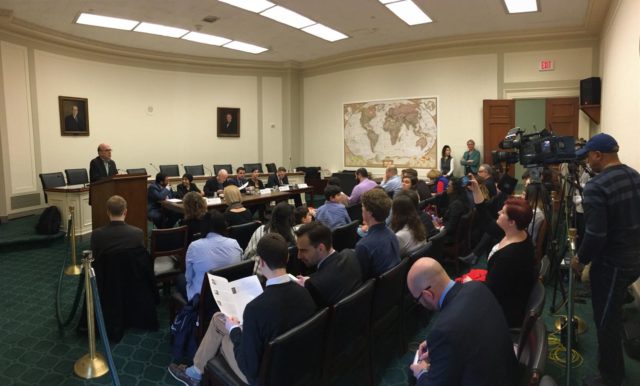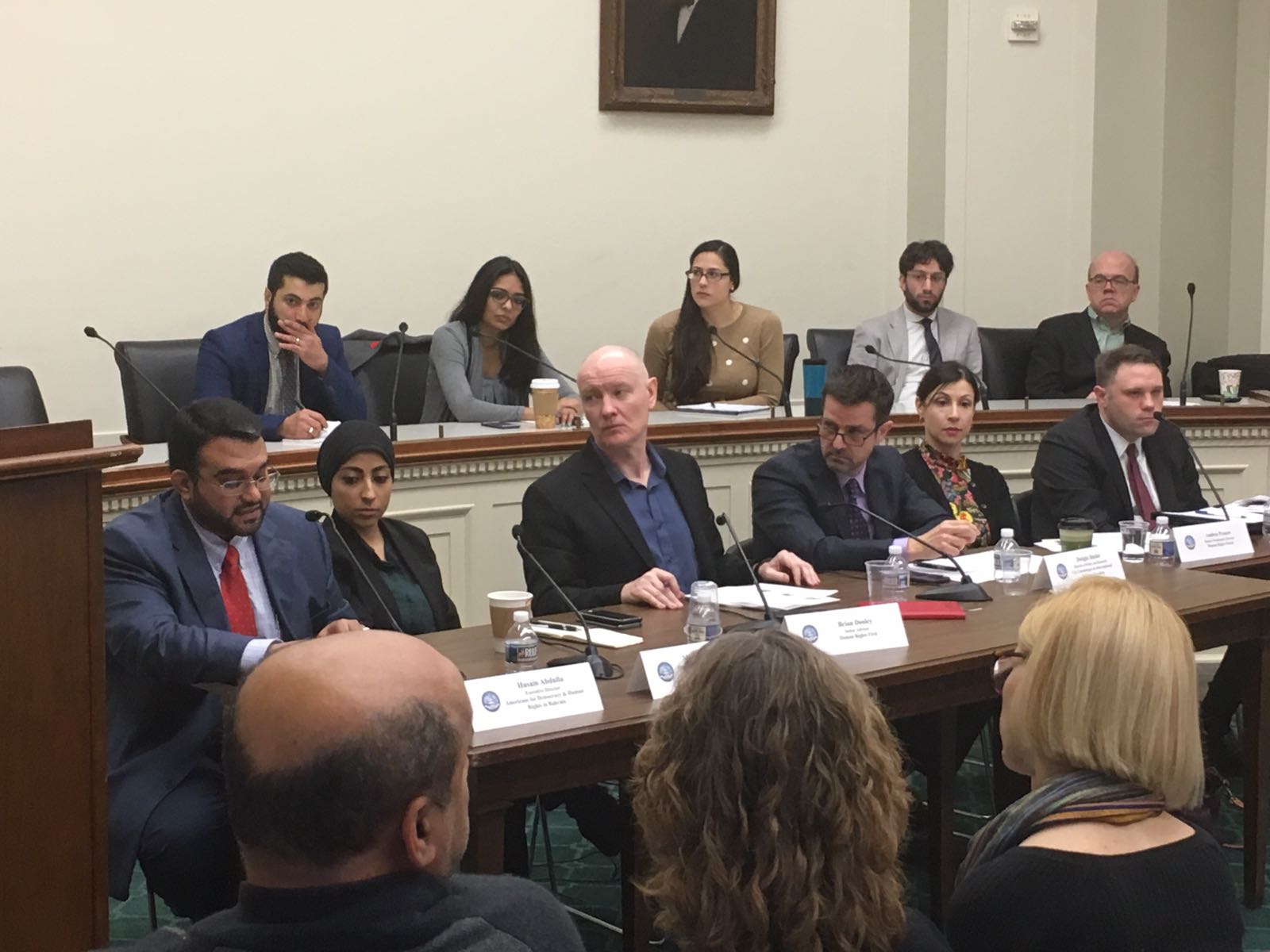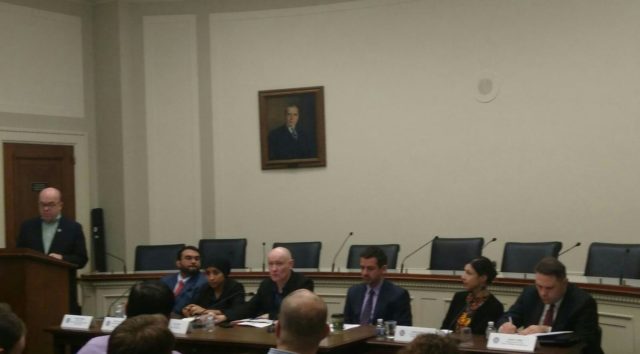
Today, 16 February 2017, Americans for Democracy & Human Rights in Bahrain (ADHRB) held a briefing with the Tom Lantos Human Rights Commission (TLHRC) of the United States (US) Congress. The briefing, entitled “Bahrain Seven Years Later, focused on the country’s deteriorating human rights situation on the seventh anniversary of the mass pro-democracy uprising in 2011. Brian Dooley, a Senior Advisor at Human Rights First (HRF), moderated the panel, which was comprised of Husain Abdulla, Executive Director of ADHRB; Maryam al-Khawaja, Special Advisor on Advocacy at the Gulf Center for Human Rights (GCHR); Andrea Prasow, Deputy Washington Director at Human Rights Watch (HRW); Dwight Bashir, Director of Research and Policy on the US Commission on International Religious Freedom (USCIRF); and Andrew Miller, Deputy Director for Policy at the Project on Middle East Democracy (POMED). The discussion comes at a time when Bahrain is deepening ties with the new US administration under President Trump, despite largely abandoning the reform recommendations of the Bahrain Independent Commission of Inquiry (BICI). Panelists explained how the Bahraini government has escalated its repression of basic human rights in recent years, and made recommendations to Congress on what role the US could play in reversing this trend.
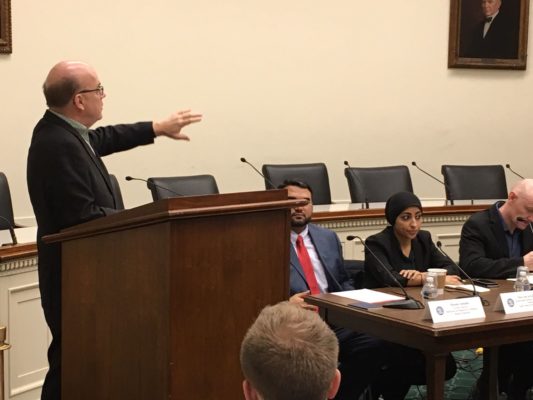 Congressman Jim McGovern, Representative of Massachusetts’s 2nd District and Co-Chairman of the TLHRC, opened the panel by emphasizing his concern for the declining situation in Bahrain. While the US government has repeatedly called on Bahrain to implement all 26 BICI recommendations, it has actually reversed much of what little progress it had originally made. As examples of the decline, Rep. McGovern noted that the authorities have now authorized the use of military courts for trying civilians and that the government is increasingly stripping individuals of their citizenship. He warned that the Bahraini government is becoming increasingly sectarian, and that it is using overblown claims of Iranian intervention to shield itself from necessary international scrutiny. Rep. McGovern concluded his introductory remarks by stressing his consistent support for Bahrain human rights defenders and calling on the government to release prisoners of conscience like Nabeel Rajab.
Congressman Jim McGovern, Representative of Massachusetts’s 2nd District and Co-Chairman of the TLHRC, opened the panel by emphasizing his concern for the declining situation in Bahrain. While the US government has repeatedly called on Bahrain to implement all 26 BICI recommendations, it has actually reversed much of what little progress it had originally made. As examples of the decline, Rep. McGovern noted that the authorities have now authorized the use of military courts for trying civilians and that the government is increasingly stripping individuals of their citizenship. He warned that the Bahraini government is becoming increasingly sectarian, and that it is using overblown claims of Iranian intervention to shield itself from necessary international scrutiny. Rep. McGovern concluded his introductory remarks by stressing his consistent support for Bahrain human rights defenders and calling on the government to release prisoners of conscience like Nabeel Rajab.
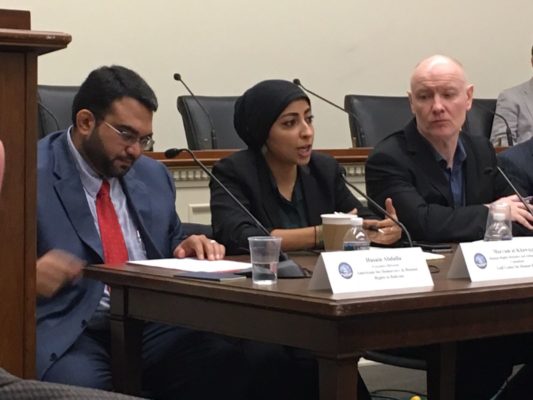 Maryam al-Khawaja began her remarks by discussing regional trends and their effects on the situation in Bahrain. Al-Khawaja said that shifting economies have impacted many of the Gulf Cooperation Council (GCC) states, and particularly Bahrain. Gas prices are being doubled and there is a decrease in government subsidies, all while poverty and unemployment are on the rise. Against this backdrop, the government continues to suppress basic freedoms, contributing to a deepening sense of desperation in some sectors of society. Bahrain is effectively a pressure cooker, she argued, which – without significant reform – could blow up into increased violence.
Maryam al-Khawaja began her remarks by discussing regional trends and their effects on the situation in Bahrain. Al-Khawaja said that shifting economies have impacted many of the Gulf Cooperation Council (GCC) states, and particularly Bahrain. Gas prices are being doubled and there is a decrease in government subsidies, all while poverty and unemployment are on the rise. Against this backdrop, the government continues to suppress basic freedoms, contributing to a deepening sense of desperation in some sectors of society. Bahrain is effectively a pressure cooker, she argued, which – without significant reform – could blow up into increased violence.
Seven years ago, in 2011, many viewed the police and military crackdown as a terrible knee-jerk reaction to the mass pro-democracy uprising, Al-Khawaja went on. But now the government has methodically institutionalized the crackdown, with a politicized judiciary being used as the main tool to silence dissent. As many as 4,000 people are currently in prison connected to the uprising, giving Bahrain the highest per capita incarceration rate in the region.
Looking at the last year, specifically, Al-Khawaja stressed that civil society space is no longer deteriorating in Bahrain – it virtually does not exist. Members of civil society groups are either in prison, in exile, or restricted by a travel ban. The government does not feel that it needs to keep the crackdown within the borders, she said, with the authorities even targeting the families of exiled activists like the Director of Advocacy for the London-based Bahrain Institute for Rights and Democracy (BIRD), Sayed Ahmed Alwadaei. Moreover, the government has amended the constitution to allow military courts to try civilians, and the judicial system as a whole is handing down more harsh punishments, including the an increase in both life sentences and the death penalty. In 2017, the authorities ended a de facto moratorium on the death penalty when they put three torture survivors before a firing squad. The executions were deemed extrajudicial killings by a UN expert as a result of due process violations like torture and forced confessions.
Al-Khawaja concluded that currently Bahrain is on a path where things will likely get worse before they get better. Nevertheless, Bahrain is a country that can still be pushed to reform, especially by its powerful allies. The government is susceptible to international pressure, and the US needs to step up and leverage its relationship with the Bahraini government before the country descends further into abuse and instability.
 Andrew Miller followed on al-Khawaja’s remarks by focusing on the actions of the Trump administration. Miller noted that President Trump’s warm embrace of the Bahraini government has emboldened its recent attacks on dissidents, human rights activists, and the marginalized Shia community. Almost immediately after the president met Bahrain’s king and said there would be no more “strain” between the US and the kingdom, security forces conducted their bloodiest protest raid in years, leaving five dead and hundreds injured. The Bahraini government proceeded to confirm the closure of Wa’ad, the last remaining political opposition party in Bahrain. Amid the worsening situation, the Trump administration rewarded Bahrain by removing Obama-era rights conditions on an existing arms sale, squandering leverage leftover from the previous administration.
Andrew Miller followed on al-Khawaja’s remarks by focusing on the actions of the Trump administration. Miller noted that President Trump’s warm embrace of the Bahraini government has emboldened its recent attacks on dissidents, human rights activists, and the marginalized Shia community. Almost immediately after the president met Bahrain’s king and said there would be no more “strain” between the US and the kingdom, security forces conducted their bloodiest protest raid in years, leaving five dead and hundreds injured. The Bahraini government proceeded to confirm the closure of Wa’ad, the last remaining political opposition party in Bahrain. Amid the worsening situation, the Trump administration rewarded Bahrain by removing Obama-era rights conditions on an existing arms sale, squandering leverage leftover from the previous administration.
Miller argued that the Trump administration’s policy fails to understand that enabling the crackdown will ultimately undermine American interests in a stable Bahrain. The US will risk complicity with an authoritarian regime and create space for substantive Iranian interference and anti-Americanism where both have been limited. The relationship could become a serious liability if the government continues on this path.
Miller continued by pointing out that there is no historical evidence that pressure cannot work in Bahrain. The Obama administration got some concessions from the government through its temporary arms holds, but the policy was inconsistent. The US needs to refocus and set forth a consistent policy that pushes for reform with clear penalties or concessions. Right now – with some useful statements intermittently coming out of the State Department – Miller noted that the US is sending mixed messages that only confuse the situation.
Miller concluded by listing recommendations that could the US could take up to encourage positive change in Bahrain. Congress needs to check the administration and promote US interests by increasing the costs on the government for supporting Bahrain’s crackdown. The Trump administration must ensure that the US military is prepared to pivot away from Bahrain – rather than simply doubling down through construction projects at the American base in Manama – and it should suspend all unconditional arms sales. Miller also urged that Congress should privately and publicly engage the Bahraini government on these issues, and that Congress should urge the administration to sanction officials linked to human rights violations, including through the Global Magnitsky Act.
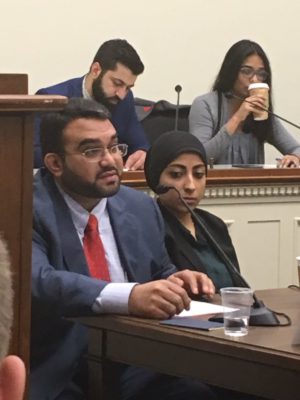 Echoing Miller and al-Khawaja, Husain Abdulla addressed the declining human rights situation, particularly in regards to the BICI recommendations, before proposing policy prescriptions that the US could take in 2018 ahead of the country’s upcoming elections.
Echoing Miller and al-Khawaja, Husain Abdulla addressed the declining human rights situation, particularly in regards to the BICI recommendations, before proposing policy prescriptions that the US could take in 2018 ahead of the country’s upcoming elections.
Under severe external pressure the king established a committee of international legal scholars, known as the Bahrain Independent Commission of Inquiry, to investigate government abuses that led to and resulted from the uprising. The king claimed to accept the recommendations, and allies like the US chose to use the BICI as a litmus test for Bahrain’s progress on human rights – and therefore its eligibility for security assistance. As one of the kingdom’s closest military partners, with the Congressional Research Service estimating that around 85 percent of Bahrain’s defense equipment is American-made, the US maintains significant leverage over the Al Khalifa monarchy to spur reform. At first it even exploited this leverage to prevent the further use of American weapons in attacks on protestors by suspending arms sales to the kingdom. Congress went so far as to require the State Department monitor Bahrain’s progress on the BICI recommendations so that the US could make an informed decision on whether to resume such security support. But the king’s reform agenda was a bluff, and the US bought it.
In recent years the government abandoned the BICI reform program almost entirely, continued Abdulla. Since 2012, virtually every independent assessment of the government’s BICI implementation has concluded that the vast majority of recommendations are unfulfilled. By the fourth anniversary of the BICI in November 2015, ADHRB and our partners found that Bahrain not only failed to make progress on the BICI, but actually made active moves away from reform, with the government fully implementing just two of the recommendations. By the end of 2017, the government reversed almost all progress previously made under the BICI reform process, including by re-empowering the National Security Agency, for example, which soon shot and killed a teenage protester.
The new US administration has completely ignored this regression in Bahrain, and it has dropped all Obama-era restrictions on support for the military. Bahrain has certainly taken note of American leniency, Abdulla pointed out, with the government going so far as to normalize the 2011 security tribunals by amending the constitution and allowing military courts to try civilians. The military has already sentenced six men to death after severe due process violations, and some claim the military tortured them while in custody.
Since 2015, the US has justified resuming assistance to the military because it no longer has any role in domestic policing, but the facts have changed: the military is now guarding, trying, and possibly even torturing civilian detainees. This compounds longstanding evidence of sectarian discrimination and extremism within the ranks, as well as the military’s takeover of the public healthcare system.
Abdulla emphasized that Congress must force the Trump administration to acknowledge this disturbing deterioration and restrict arms sales. This year, 2018, is an especially important time for Bahrain because there will be the parliamentary elections in the fall, he stated, and Bahrain wants the international community (especially the US) to recognize the elections as fair and free. Yet there will not be anything remotely close to such an election with so many political prisoners in jail. Congress needs to make it clear that if the Bahraini government wants an endorsement of these elections, it needs to begin by releasing all prisoners of conscience
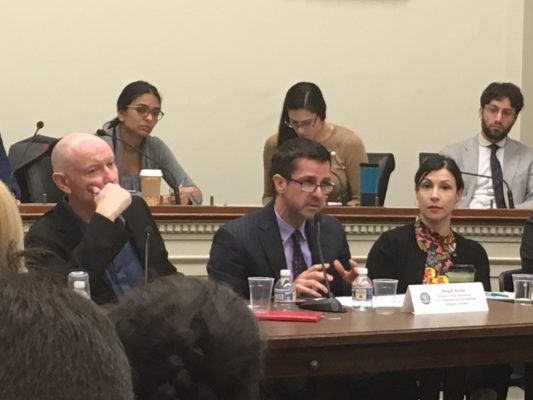 Dwight Bashir used his remarks to focus on the current situation of religious freedom in Bahrain, and specifically discrimination against the country’s Shia majority community. Overall, there has been a steady decrease in the freedom of religion and belief, he began. Initially, in the aftermath of 2011, it seemed like the government was making some real progress on this front. It was unprecedented for the Bahraini government to establish an independent body like BICI, and it actually started to implement recommendations to rebuild demolished Shia mosques. Many were repaired by the government (though some by the Shia communities themselves), and reinstated many Shia students and workers that had faced discrimination.
Dwight Bashir used his remarks to focus on the current situation of religious freedom in Bahrain, and specifically discrimination against the country’s Shia majority community. Overall, there has been a steady decrease in the freedom of religion and belief, he began. Initially, in the aftermath of 2011, it seemed like the government was making some real progress on this front. It was unprecedented for the Bahraini government to establish an independent body like BICI, and it actually started to implement recommendations to rebuild demolished Shia mosques. Many were repaired by the government (though some by the Shia communities themselves), and reinstated many Shia students and workers that had faced discrimination.
However, in the last several years, the government has reversed course, as reflected in USCIRF’s upgrading Bahrain to a tier two violator of religious rights. Al-Wefaq, the leading Shia opposition group, was forcibly closed, and the authorities started targeting dozens of clerics. One of the most prominent Shia clerics, Sheikh Isa Qassim, was arbitrarily denaturalized and could face deportation. While the government characterizes the crackdown as for political or security measures, many of the clerics targeted are solely religious figures.
USCIRF, which has had regular access to the Bahraini government, has found the authorities are continuing to use a sectarian narrative of Iranian influence as a justification for this discrimination, even though the BICI found that there is no real evidence for this. These accusations only contribute to sectarianism and heighten societal divides.
US policy with Bahrain has been inconsistent, Bashir added. While the Obama administration vocally condemned the destruction of Shia mosques, and that may have helped on that specific BICI recommendation, but this public stance did not ultimately alter what Bashir said was “business as usual” between the US and Bahraini governments. Indeed, he continued, this demonstrates a discontinuity between talking points coming out of the Department of State and deepening security cooperation coming from the Pentagon. To efficiently effect change, this discontinuity needs to be addressed and the position of the Pentagon and the State Department need to align around reform. When Secretary Tillerson says that Bahrain needs to stop discriminating against its Shia communities, this needs to be reflected in the statements and actions of other parts of the US government.
Bashir finished by recommending that Congress use tools like the Magnitsky Act as a way for the US government to demonstrate its desire for reform and to hold perpetrators of abuses responsible. He also stressed that there still has not been accountability at high levels of the Bahraini government for continuing sectarian discrimination. Because of the poor situation of human rights and religious freedom currently, the fall elections will be an opportunity to take stock of whether the government will double down on repression and in which ways it might do so.
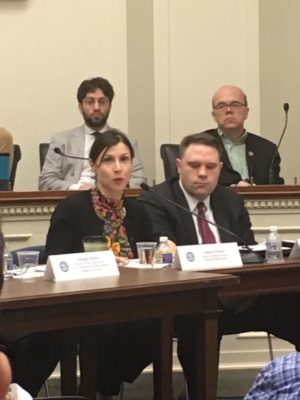 Andrea Prasow concluded the discussion by summarizing and contextualizing the situation in Bahrain within the framework of HRW’s World Report 2018. One major theme in the report is the rise of populism and peoples’ resistance against it and the decline of law and order. Due to extensive and systematic repression, the framework for this resistance is being eroded in Bahrain. An important part of this framework is international and multinational pressure in support of domestic civil society efforts.
Andrea Prasow concluded the discussion by summarizing and contextualizing the situation in Bahrain within the framework of HRW’s World Report 2018. One major theme in the report is the rise of populism and peoples’ resistance against it and the decline of law and order. Due to extensive and systematic repression, the framework for this resistance is being eroded in Bahrain. An important part of this framework is international and multinational pressure in support of domestic civil society efforts.
Unfortunately, however, the Bahraini government’s repression is destroying the kingdom’s once thriving civil society and cutting it off from the international community. This ranges from systematic restrictions on free speech to the closing of Bahrain’s only independent newspaper, Al-Wasat. But these restrictions are not focused only on those dissidents who criticize the Bahraini government – they are also used to harass, arrest, and imprison those who criticize Bahrain’s Gulf allies, like Saudi Arabia, Prasow stated.
Prasow concluded her remarks by suggesting several recommendations. She began by insisting that benchmarks towards reform be imposed along with any arms sales. This is manageable, she said, pointing to how quickly Bahrain implemented some of the BICI recommendations – only to just as quickly reverse them. Another option is to impose sanctions on institutional actors like judges and prosecutors through mechanisms like Global Magnitsky, although this is more controversial. Congress must nevertheless pursue pressures up to and including sanctions, and should push the administration to restrict further cooperation with the Bahraini government in the absence of reform.
